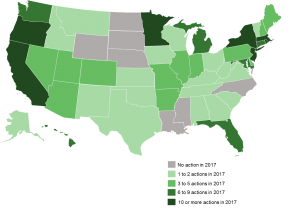NCCETC Launches The 50 States of Electric Vehicles Quarterly Report
Finds 43 States Took Action on Electric Vehicles in 2017
Raleigh, N.C. – (February 7, 2018) The N.C. Clean Energy Technology Center (NCCETC) launched its new report series, The 50 States of Electric Vehicles, with a special 2017 Review issue. The new series, which will take the form of quarterly reports beginning with Q1 2018, provides insights on state regulatory and legislative discussions and actions on electric vehicles and charging infrastructure.
Key Electric Vehicle Actions in 2017
The report finds that 43 states and the District of Columbia took some type of action related to electric vehicles during 2017 (see figure below). Specifically, the report finds that:
- 34 states considered or adopted changes to the regulation of electric vehicles, including registration fees, electricity resale rules, and siting of charging infrastructure.
- 20 states plus D.C. took action to study or investigate some aspect of electric vehicles.
- 19 state + D.C. considered or approved new financial incentive programs, or changes to existing incentive programs for electric vehicles or electric vehicle supply equipment.
- Utilities or legislatures in 17 states plus D.C. took action related to the deployment of electric vehicles and charging infrastructure.
- 17 states considered policy changes to encourage electric vehicle market development.
- Utilities or state legislatures in 13 states plus D.C. considered new utility rate tariffs for electric vehicle charging, or changes to existing tariffs.
2017 Legislative and Regulatory Action on Electric Vehicles

“As projections for the number of electric vehicles sold continues to rise, we see many states taking pre-emptive steps to help facilitate and prepare for this transition,” noted Heather Brutz, Clean Transportation Program Manager at NCCETC. “This includes directly funding vehicles and infrastructure, streamlining the permitting process, and preparing for a transportation funding future where gasoline-powered vehicles make up a smaller percentage of vehicles on the road.”
The report finds that a total of 227 state and utility-level actions related to electric vehicles were proposed, pending, or decided in 2017, with California, New York, Massachusetts, and Minnesota seeing the greatest number of actions during the year. The most common actions were related to electric vehicle fees, rebate programs, utility tariffs for electric vehicle charging and electric vehicle studies.
The report also notes top electric vehicle policy trends of 2017:
- State policymakers and regulators addressing barriers to charging infrastructure development;
- Investigation of electric vehicles as part of broader grid modernization efforts;
- Funding for electric vehicle infrastructure moving beyond level 2 charging;
- Utilities proposing dedicated electric vehicle charging rates;
- States and utilities expanding incentives for electric vehicles and charging infrastructure; and
- States considering additional fees for electric vehicle owners.
“As states and utilities undertake grid modernization efforts, electric vehicles are consistently being included in these discussions,” said Autumn Proudlove, Manager of Policy Research at NCCETC. “Key issues under consideration in 2017 were utility rate design for electric vehicle charging and the role of utilities in deploying charging infrastructure.”
Media Contact: Shannon Helm, NCCETC, shannon_helm@ncsu.edu